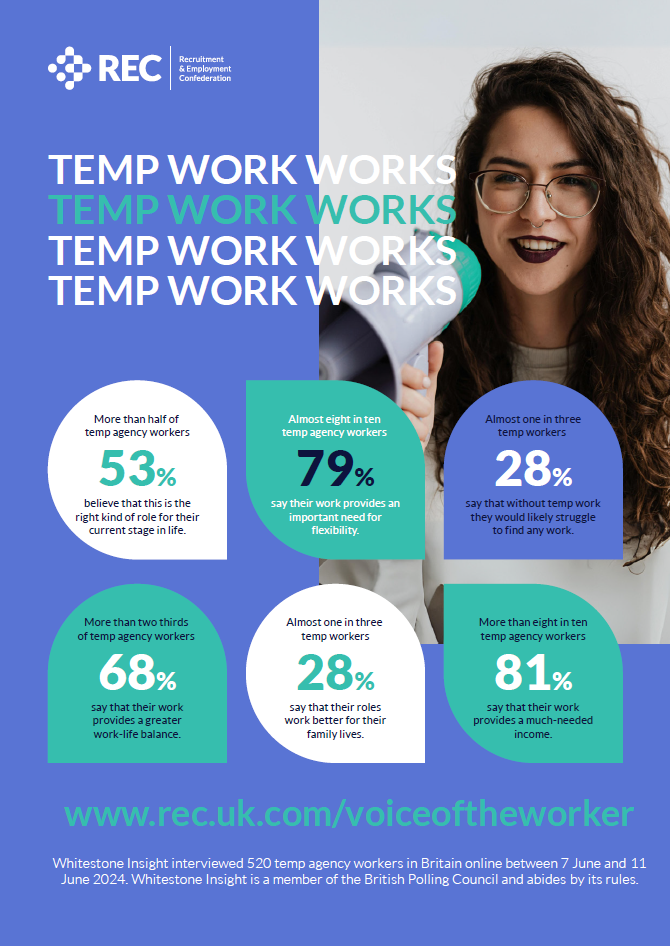

Press releases

The UK’s world-leading temporary workforce needs championing and protecting, suggests the Recruitment and Employment Confederation (REC), as it launches its people-first ‘Voice of the Worker’ campaign.
Britain’s temporary labour market is working well for people, firms and the modern economy – with about a million temps working every day. And its success at bringing and retaining people in the labour force is vital to the new government’s central mission of driving growth.
By putting the real-life stories of temps at its heart, REC’s campaign shows why temping works for many individuals, and that government, businesses and unions should collaborate closely to support it. This comes at a critical time as the new government pushes on with its Employment Rights Bill within its first 100 days in power. This is leading to a robust debate because highly regulated agency work already offers employment rights and in-work progression. And when the government reforms the Apprenticeship Levy as promised, it should also create more opportunities for them to upskill.
Neil Carberry, REC Chief Executive, said:
“Flexibility at work is something to feel optimistic about. It is working for millions of people. Individual choice and employers’ need for a versatile workforce can be brought together to deliver better careers and higher productivity. As our new survey and video case studies show, flexibility is a vital bridge to work for people who need to balance caring responsibilities, work despite health issues, combine work and study, and upskill.
“Government needs to make sure new rules support temps and that means having a real understanding of their lives. Firms too should always ensure that they think of temporary workers as people to support and develop. Getting this right is crucial because our acute labour and skills shortages mean we need to fill record numbers of vacancies, with a mix of temporary and permanent jobs. And we can close productivity gaps by giving people more varied and developmental career paths.
“Good and lasting workforce changes that are effective for workers and businesses, happen when employers and government work together to determine what works for everyone. We passionately hope our new campaign will help even more policymakers appreciate the opportunity temporary work brings, the benefits it offers, and why it is life-changing in many ways.
“The new government has won a huge mandate to go for growth - and we are excited to be working with them to support that - but as our Voice of the Worker campaign shows, success in that mission rests primarily on getting the people stuff right in workplaces around the country.”
For the campaign, REC commissioned Whitestone Insight to interview 520 temp agency workers in Britain online in June 2024, to hear what they think about agency work and why it matters to them. Polling found:
And this autumn the REC will highlight video and written case studies of temporary workers, in which they explain the reasons for wanting flexibility and the benefits of temp working, in a variety of sectors in our economy.
Notes to editors
Learn more about the Voice of the Worker campaign.
The REC will promote the Voice of the Worker campaign on its website and social media channels, as well as it forming a core of its conversations with policymakers, think-tanks and political parties during the autumn, which is such a key period of the Parliamentary year. REC is also calling on its members to help share the campaign even further, helping amplify the importance of temporary work and in turn the role agencies play in enabling this work.
The REC case studies for the Voice of the Worker campaign include:
Clare Wray is a radiographer. She said:
“I've worked in the NHS for 18 years, but I just found that I could have an impact and effect with my clinical knowledge and experience in a way that I couldn't do in permanent roles. As locums, you must go in and be effective straight away because the teams are already very short staffed. I seem to have the skill set to be able to go in straight away and be effective straight away. I always want to stay a radiographer, but hopefully I'll achieve my aim of, of succeeding to be a qualified radiation section advisor.”
Ikenna Okpara, temp worker and MA screenwriter, said:
“The importance of working and studying is taking care of the financial burden, pays your rent, buys food. As an international student, I'm only allowed to work for 20 hours a week and it would be nice for students, especially master students, to have more hours."
Micha Clacken, 33, is a 111 clinical advisor in the West Midlands:
“Agency nursing has given me the freedom to pick my own hours which in turn has helped me manage my mental health. I have found being able to book short hours, more often has given me the freedom to balance work with being a single mother without feeling overwhelmed. Without agency nursing I would have left the profession many years ago due to the inflexible hours a substantive post requires.”
Mandy Bowpitt 56, has worked for NHS for 30 years and now works as a 111 clinical advisor in Southwest England:
“Just over three years ago, I came to a crisis in my working life – working more than 60 hours a week and only being paid for 37.5. I submitted an application to join the recruitment agency, and I now get to offer my services as a very experienced 111 clinician for the hours I feel I am able to give, with no repercussions, no aggravations and no unpaid overtime.”
Siu Ho Lee, 43, has worked as a picker through an agency in Milton Keynes for eight months.
“I am grateful for the flexibility because it provides part-time hours during the school day, which is essential for balancing my work and family responsibilities. The flexibility in my schedule allows me to meet particular lifestyle commitments, such as caring for my children. The opportunity to work part-time has been invaluable to me, and I plan to continue in temporary work as long as it continues to offer these part-time hours that fit my needs.”
Santosh Pabbaraju, 34, is currently a logistics associate who inspects and coordinates goods and is working through an agency in the Midlands.
“Temporary work has allowed me to gain a wealth of experience across different roles and industries. Each assignment has brought new challenges and learning opportunities, enriching my skill set and broadening my professional network. This variety keeps the work engaging and allows me to continually grow and adapt.”
Edith Breeze, 74, has worked for more than 50 years, is a 111 Clinical Advisor working through an agency in Southwest England:
“I retired from a senior role within the NHS at the age of 69, thinking and feeling far from ready for a very limiting future. Being able to continue in a temp work role through an agency benefited not only my patients and the service providers I work for, it also maintains my mental health and allows a fantastic work life balance with my family. I have recommended this opportunity to several of my colleagues who, like me, face the daunting decision about retirement when a flexible work role opportunity is there for them as long as they are able.”
The government’s planned changed include: day one rights; the introduction of two categories of employment status; a ban on ‘exploitative’ zero-hours contracts; and giving workers rights to request flexible working.
Overcoming shortages - How to create a sustainable labour market, REC, July 2022
In this report, we show exactly how much damage could be done if we do not step up. With a 10% surge in demand for staff across the economy, and the labour market restricted by shortages, we could see a 1.2% fall in expected GDP and productivity by 2027 – costing the economy anywhere between £30 billion and £39 billion every year. This figure is just short of the entire current defence budget, or two whole Elizabeth Lines.
Click here to view all REC press releases and for more information and interview enquiries, contact the REC Press Office on 020 7009 2157, 020 7009 2129 or pressoffice@rec.uk.com. Outside of regular office hours, please call 07702 568 829.
The REC is the voice of the recruitment industry, speaking up for great recruiters. We drive standards and empower recruitment businesses to build better futures for great candidates and themselves. We are champions of an industry which is fundamental to the strength of the UK economy.
Find out more about the Recruitment & Employment Confederation at www.rec.uk.com.

Share this article